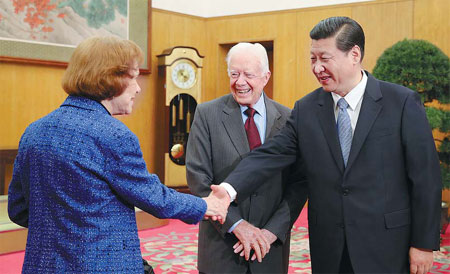Xi pursues better ties between China, US
|
Former US president Jimmy Carter introduces his wife, Rosalynn, to Xi Jinping, China's top political leader and head of the military, in Beijing on Thursday. Xu Jingxing / China Daily |
Both nations should strive to foster respect and partnership, experts say
Party chief Xi Jinping called on China and the United States to "defy hardship" and "accumulate positive energy" in developing their ties, as he met with former US president Jimmy Carter on Thursday in Beijing.
It was the first time that Xi has met a senior US politician since he was elected China's top political leader and head of the military last month.
Analysts said that while managing China-US ties will be a major task for Xi, strategic trust between China and the US still needs more effort and can only be achieved by increasing cooperation.
During the half-hour meeting, Xi told Carter, 88, that China and the US should strive to develop mutual respect and a win-win cooperative partnership.
During his term as US president from 1977 to 1981, Carter personally ensured the establishment of China-US diplomatic ties.
Xi's meeting with the former president was also his first with a senior US politician since the US presidential election was held in November.
Under the new circumstances, the two countries should defy hardship, and adhere to the pioneering spirit of being innovative in developing their ties, Xi said.
As the new leader of the country, Xi's foreign policy, especially China's ties with the US and neighboring countries, has been the focus of world attention.
Last week, during his first meeting as Party chief with a group of foreigners who work in China, Xi said that China will adhere to reform and the opening-up policy.
China and the US, the world's two largest economies, have become each other's second-largest trade partners. The two have also maintained cooperation on regional hot spot issues and global affairs.
Yet factors such as continuous US arms sales to Taiwan and the repetitious playing up of China's "military expansion" have increased the friction in bilateral ties from time to time.
During a seminar held on Wednesday in Beijing, Carter, whose NGO, the Carter Center, has been contributing to Chinese social development for many years, said he will keep boosting communication between China and the US.
In the long term, big enterprises such as General Motors Co and Coca-Cola Co, will play a more significant role in the Sino-US relationship, said Carter. He added that student exchanges and increasing tourism will also help stabilize ties.
US Ambassador to China Gary Locke, who also attended the seminar, said: "We must build strategic trust, and that can only be achieved by working together in ways that will achieve real results and real benefits to the values of our people and to the international community."
"Many global issues cannot and will not be resolved without cooperation and the joint partnership of the United States and China. Working in those ways, we can certainly move away from mistrust and build trust," Locke said.
According to Yu Pinhai, chairman of the Center of Sino-US Relations at Tsinghua University, US scholars should change their habitual framework of condemning China when analyzing China-related problems.
"Let's find a way to change how the two countries perceive each other. The way US citizens view China should evolve in light of the new circumstances," Yu said.
Contact the writers at wujiao@chinadaily.com.cn and qinzongwei@chinadaily.com.cn
Pu Zhendong contributed to this story.



















